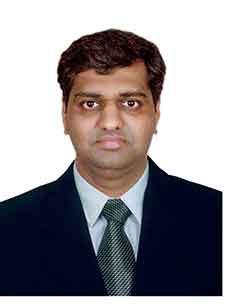|
|
|
You can get e-magazine links on WhatsApp. Click here
|
|
|
|
|
|
"Introduce lot to lot checking of colours as done in US"
|
|
Monday, 04 January, 2016, 08 : 00 AM [IST]
|
|
|
|
fiogf49gjkf0d  Neelikon Dyestuffs was founded in 1983 by Mukund Turakhia and was incorporated into the present company in 1994 as Neelikon Food Dyes and Chemicals Ltd. Neelikon manufactures colours from its plants in Dhatav. It also produces specialty fluorescent colours used in manufacturing of daylight fluorescent pigments and other specialty industrial applications. Satyen Turakhia, director, Neelikon Food Dyes & Chemicals Ltd, in an email interaction with Anurag More throws light on the current and future scenario in the Indian food colour industry. Excerpts: Neelikon Dyestuffs was founded in 1983 by Mukund Turakhia and was incorporated into the present company in 1994 as Neelikon Food Dyes and Chemicals Ltd. Neelikon manufactures colours from its plants in Dhatav. It also produces specialty fluorescent colours used in manufacturing of daylight fluorescent pigments and other specialty industrial applications. Satyen Turakhia, director, Neelikon Food Dyes & Chemicals Ltd, in an email interaction with Anurag More throws light on the current and future scenario in the Indian food colour industry. Excerpts:
How big is the food colour industry in India? What are the types of food colours available in the market?
The population of India is around 1.20 billion and considering food is a daily necessity, the demand for food colour should be quite large. But considering penetration of packaged foods is still quite low and due to low per capita income, demand for packaged food is not as high as in the first world countries or even other Asian countries like Thailand, Indonesia. No statistics are available to quantify food colour consumption.
The following colours are allowed for food use in India
Name BIS No
Tartrazine IS 1694 : 1994
Sunset Yellow IS 1695 : 1994
Erythrosine IS 1697 : 1994
Ponceau 4R IS 2558 : 1994
Carmoisine IS 2923 : 1995
Brilliant Blue IS 6406 : 1994
Indigo Carmine IS 1698 : 1994
Fast Green FCF IS 6022 : 1994
Mixtures of above IS 5346 : 1994
Colours
What are the functional aspects and challenges in natural colouring in food and beverages?
Natural food colours are less stable and more expensive. For a country like ours where price is a key driver for any product, producers are required to keep costs low and hence due to technical challenges coupled with high prices, use of natural colours is very limited in our country.
What changes have you witnessed in consumer's taste and preferences?
Overall our market is very nascent. Still a lot of adulteration is noticed in the industry and even basic food products like milk, grains, etc. are, as you know, adulterated. With growth in the middle class, we notice demand for branded packaged food is increasing. This is increasing demand for well-known producers like Neelikon who supply their food colours all over the world, meeting international quality.
Where does India stand compared to developed countries?
India today is the world's largest producer for synthetic food colours. Honestly, all types of quality exists in India; from excellent to very poor. One has to choose their suppliers carefully to work with Indian food colour producers. Users should check factory setup by visiting manufacturers' production site to ensure they are working with responsible suppliers who have proper manufacturing and testing facilities as also adhere to local norms of effluent treatment, labour and taxation.
With current problems for Nestle's Maggi, what steps should be taken by companies with respect to their products?
Producers of food colours should have proper laboratory facilities with latest instruments, method of testing and trained manpower to check impurity profile in food colours. Top management should invest in these facilities and should not look at this as cost but as investment.
What are the expectations of industry players from the government?
Our request to GoI would be to introduce lot to lot checking of food colours as done by US FDA. Neelikon can help GoI, to set up laboratory with appropriate test methods and train chemists to check impurities correctly.
Brief us about products offered by Neelikon.
Neelikon offers high quality food colours, cosmetic colours and fluorescent colours (for specialty industrial application). Our colours are sold in more than 100 countries with more than 50 per cent of our products sold to first world countries (and regions) like USA, Japan and Europe. Same international quality is supplied in India, thus offering a world-class product to Indian consumers. We are an Indian company with global vision competing with the best producers of food colours from USA and Japan.
What makes you different from other players?
Our founder and MD Mukund Turakhia is the father of Indian food colour industry. A chemical engineer from UDCT, (Department of Chemical Engineering, Mumbai) he is a technocrat leading our company, producing international quality material for Indian customers. We are today the largest suppliers of food colours to first world markets like Japan, which is the world's most stringent market for food colours. We have the widest range of food & cosmetic colours in the world - all of which are produced in-house with our indigenous technology. Many of our colours are produced by only Neelikon in India. We compete with the world's best producers from USA, Japan and Western Europe.
Tell us something about your expansion plans. How much will you be raising for the same?
Expansion is a continuous activity in Neelikon. We are zero-debt (long-term) company and expand with internal accruals. At this moment, we have plans to continue our expansion plans in 2016 by increasing capacity of production of food dyes and lakes, and effluent treatment capacity. All funding will be done from internal accruals.
|
|
|
|
|
|
|
|
|
|